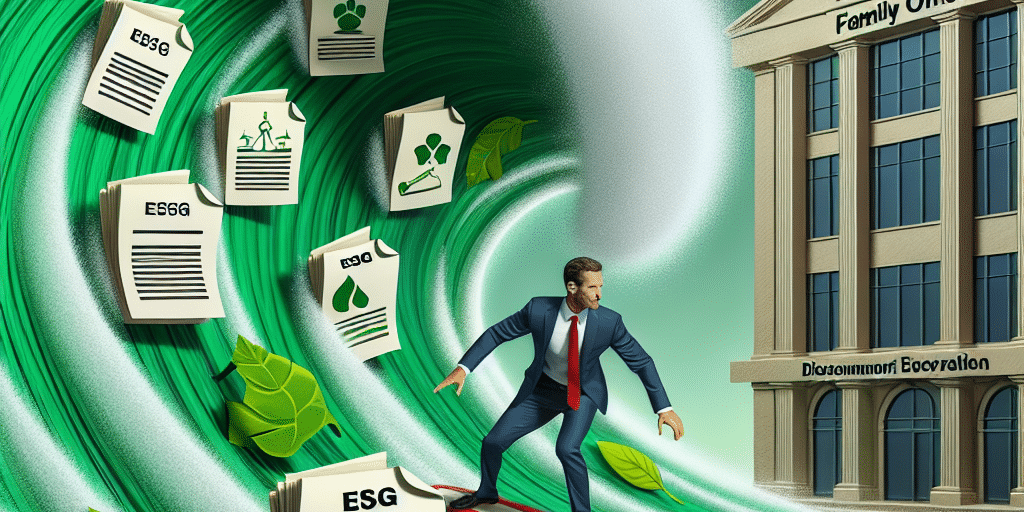Navigating the Green Wave: How ESG Disclosure Regulations Are Shaping Family Office Investment Strategies
In the past few years, Environmental, Social, and Governance (ESG) criteria have emerged as pivotal elements in investment strategies worldwide. The rise of ESG has been characterized by a growing awareness among investors regarding the fundamental impact of climate change, social equity, and corporate governance. This shift is intricately linked to the evolving landscape of ESG disclosure regulations, which are reshaping how family offices, responsible for managing the wealth of affluent families, design and implement their investment strategies.
Understanding the ESG Landscape
Family offices traditionally prioritized financial returns above all else, but this perspective is becoming increasingly complex. The advent of ESG factors has prompted these entities to recognize that sustainable investing can yield significant financial performance while concurrently addressing global challenges. ESG criteria encompass a wide range of issues, such as carbon emissions, labor practices, board diversity, and community engagement. The integration of these criteria is no longer optional; it is fast becoming a regulatory requirement globally.
The Regulatory Environment
Regulatory bodies across the globe are forging a framework that compels companies to disclose their ESG-related risks and opportunities. Initiatives such as the European Union’s Sustainable Finance Disclosure Regulation (SFDR) and the United States’ Securities and Exchange Commission (SEC) focus on enhancing transparency and comparability in corporate ESG reporting. These regulations require firms to provide accurate, standardized, and precise information regarding their ESG performance.
As compliance becomes mandatory, family offices must adapt their investment strategies to align with these evolving standards. This shift not only helps them avoid regulatory penalties but also enhances their credibility in the eyes of stakeholders who demand transparency and accountability.
Implications for Investment Strategy
Due Diligence and Risk Assessment: With enhanced regulatory scrutiny, family offices are now compelled to conduct more thorough due diligence. The need to assess ESG risks in potential investments means incorporating ESG data into the investment evaluation process. Family offices are increasingly utilizing ESG metrics to evaluate how companies mitigate risks related to climate change, social justice, and governance failures. Investment decisions are thus shaped not just by potential returns but by a company’s commitment to sustainable practices.
Portfolio Diversification: Regulatory changes are nudging family offices to diversify their investment portfolios toward companies with strong ESG profiles. Investing in renewable energy, sustainable agriculture, and socially responsible technology firms has seen a marked increase. This shift helps in not only achieving financial goals but also in aligning investments with the family values often rooted in social responsibility.
Engagement with Stakeholders: Under evolving ESG regulations, family offices are increasingly recognizing the importance of stakeholder engagement. They are not merely passive investors; rather, they are lean into their roles as active participants, advocating for better sustainability practices within the companies they invest in. By exercising shareholder rights, family offices can influence corporate governance and operational protocols towards more sustainable practices.
- Reporting and Accountability: Regulation has also ushered in a new era of accountability. Family offices are now required to report the ESG performance of their investments to stakeholders, necessitating the development of robust ESG reporting frameworks. This increased focus on accountability can enhance a family office’s reputation and attract like-minded investors.
Challenges Ahead
Despite the positive impacts of ESG disclosure regulations, family offices face challenges while navigating this landscape. The variety of regulations, inconsistent reporting standards, and the complexity of assessing ESG factors can complicate investment strategies. Furthermore, there is often a knowledge gap within family offices regarding ESG issues, making it paramount to invest in education and expertise in sustainable investing.
Future Outlook
The trend toward ESG integration, driven by regulatory mandates, is expected to accelerate in the coming years. Family offices that can adeptly navigate this green wave stand to benefit not just financially but also in terms of legacy and societal impact. As ESG reporting becomes a normalized part of the investment landscape, family offices have the opportunity to redefine their approaches, leading to investments that reflect both fiscal responsibility and a commitment to building a sustainable future.
In conclusion, family offices are at a pivotal crossroads as they adapt to the challenges and opportunities presented by ESG disclosure regulations. By embracing these changes, they can not only enhance their investment strategies but also contribute to a more sustainable and equitable world. The green wave is not merely an investment trend; it represents a monumental shift towards a future where profitability and social responsibility can coexist.











